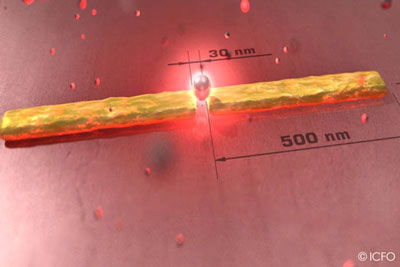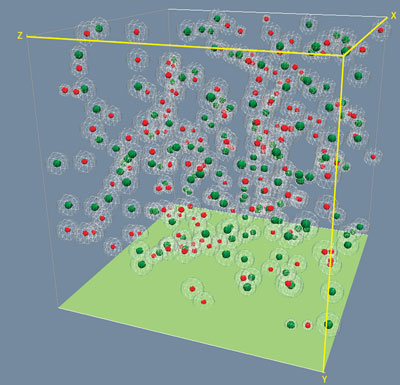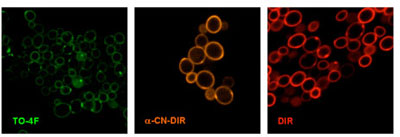Groundbreaking curriculum to offer unparalleled education and training to support nanotechnology career opportunities and development of New York's high-tech workforce.
Mar 27th, 2010
Read more
In the Max Planck Institute for NanoBiophotonics in Goettingen, Stefan Hell has developed fluorescence microscopy methods for observing objects on the nanoscale and with his colleagues Vladimir Belov and Christian Eggeling a new series of photostable dyes that can be used as fluorescent markers has been realised.
Mar 26th, 2010
Read more
'Loading-unloading' effect of grain boundaries key to repair of irradiated metal.
Mar 26th, 2010
Read more
 Photonics is a highly multidisciplinary field with diverse ramifications, one of which is nanobiophotonics, a subfield focusing on developing tools for advancement in nanoscience.
Photonics is a highly multidisciplinary field with diverse ramifications, one of which is nanobiophotonics, a subfield focusing on developing tools for advancement in nanoscience.
Mar 26th, 2010
Read more
Die Methode, mit Hilfe der Nanotechnologie Biomolekuele ueber magnetische Transporter zu einem Sensor zu transportieren, haben sich die Forscher schon patentieren lassen.
Mar 26th, 2010
Read more
The Sri Lanka Institute of Nanotechnology Pvt. Ltd (SLINTEC) recently announced the launch of a highly informative website - the first Sri Lankan nano-based information portal.
Mar 26th, 2010
Read more
Scientists presented a design strategy to produce the long-sought artificial leaf, which could harness Mother Nature's ability to produce energy from sunlight and water in the process called photosynthesis.
Mar 26th, 2010
Read more
 Introducing additional complexity to a simulation gives researchers better insight into how cellular signaling networks might operate.
Introducing additional complexity to a simulation gives researchers better insight into how cellular signaling networks might operate.
Mar 26th, 2010
Read more
The University of Pennsylvania's School of Engineering has developed a new Master of Science Degree program in Nanotechnology. The program has options for Nano Enabling Energy, Nano Enabling Medicine, Nanoelectronics and more.
Mar 26th, 2010
Read more
Virginia Lorenz, who recently joined the University of Delaware faculty as an assistant professor of physics and astronomy, is working on one of the hottest areas in physics - quantum memories. These devices store information in a flash of light and may serve as the basis of future communications networks.
Mar 26th, 2010
Read more
A team of researchers and clinicians from UCLA's Jonsson Comprehensive Cancer Center and the California Institute of Technology has published the first proof that a targeted nanoparticle - used as an experimental therapeutic and injected directly into a patient's bloodstream - can navigate into tumors, deliver double-stranded small interfering RNAs (siRNAs) and turn off an important cancer gene.
Mar 26th, 2010
Read more
University of Maryland researchers have created a completely new way to produce high quality semiconductor materials critical for advanced microelectronics and nanotechnology.
Mar 25th, 2010
Read more
The Department of Electrical and Computer Engineering at Johns Hopkins presents The Jan M. Minkowski Memorial Lecture in Quantum Electronics, 'Nonlinear Optics on the Nanoscale: Towards Terabit Optical Processors', with speaker Dr. Benjamin J. Eggleton,
Mar 25th, 2010
Read more
The Federal government's ten-year-old program for nurturing and coordinating the young science of nanotechnology has been highly successful and has helped to make the United States the world's leader in this increasingly valuable manufacturing sector, concludes an independent report prepared for the President and Congress. But that leadership position is threatened by several aggressively investing competitors such as China, South Korea, and the European Union, according to the report.
Mar 25th, 2010
Read more
 Scientists are advancing the state-of-the-art in live cell fluorescent imaging by developing a new class of fluorescent probes that span the spectrum - from violet to the near-infrared. The new technology, called fluoromodules, can be used to monitor biological activities of individual proteins in living cells in real time.
Scientists are advancing the state-of-the-art in live cell fluorescent imaging by developing a new class of fluorescent probes that span the spectrum - from violet to the near-infrared. The new technology, called fluoromodules, can be used to monitor biological activities of individual proteins in living cells in real time.
Mar 25th, 2010
Read more
Prof. Dr. Peter Fromherz am Max-Planck-Institut (MPI) fuer Biochemie in Martinsried hat mit der ehemaligen Forschungsabteilung der Infineon Technologies AG einen einzigartigen Neurochip mit 16.384 Sensoren auf einem Quadratmillimeter Chipflaeche entwickelt. Das dabei gewonnene Wissen und das Entwicklungs-Knowhow werden jetzt nach Reutlingen transferiert, um die Neurochip-Technologie weiter zu entwickeln.
Mar 25th, 2010
Read more




 Subscribe to our Nanotechnology News feed
Subscribe to our Nanotechnology News feed